These are my top 5 commentaries on the book of Psalms. I have been a minister for thirty years or so and I have discovered many great commentaries on the books of the Bible.
I will explain what types of Bible commentaries I look for and why I choose these types of commentaries. And I will pick my 5 top commentaries on the book of Psalms.
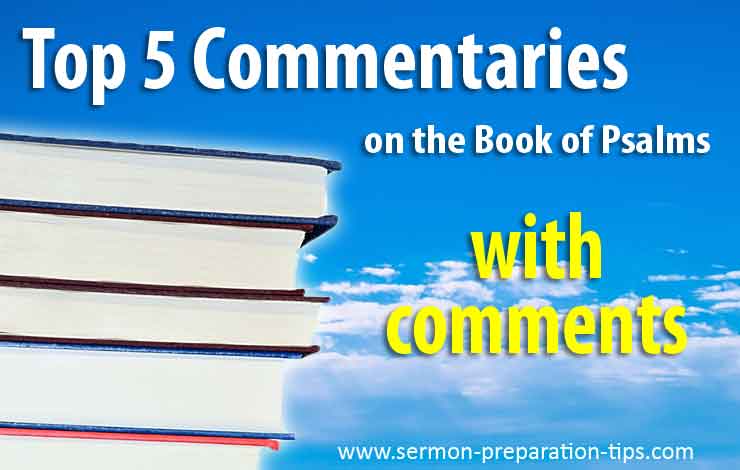
Different Types of Bible Commentaries
When I look for commentaries on books of the Bible, I look for different types of Bible commentaries. I never purchase a Bible commentary unless I know what type of commentary it is.
There are four basic categories of Bible commentaries. To keep it super simple (KISS), I tend to classify them into four basic categories. These categories may vary between writers.
1. Expository Commentaries
Expository commentaries are usually written by ministers and bible teachers who tend to teach through the Bible verse by verse.
These commentaries provide teaching notes, sermon outlines, sermon illustrations and practical applications.
Generally, these commentaries will discuss the meaning of the biblical text at a fairly simple level with basic references to the original language.
These expository commentaries are also referred to as sermonic commentaries or expositional commentaries.
The main benefit of these types of Bible commentaries is that they provide insights into how the author works with the text (teaching notes) and how the author works the sermon outline, illustrations and applications.
It is also important to note that the academic levels may vary slightly from commentary to commentary and author to author.
2. Exegetical Commentaries
Exegetical commentaries are usually authored by Bible scholars, seminary lecturers or theologians.
These types of Bible commentaries are more technical and academic in presentation. These commentaries focus on the original languages, biblical context and grammar of the text. The emphasis will be on the meaning of the biblical text to the original readers.
These commentaries typically discuss several possible interpretations of the biblical text weighing up the pros and cons of each view.
These exegetical commentaries are often referred to as word study commentaries, textual or technical commentaries.
The main benefit of these types of Bible commentaries is that they provide insights into how the author works with the original languages, especially the context and grammar of the text; how the author works with the interpretation of the biblical text, especially if there are differing views; and how the author organizes the biblical information for sermon preparation.
It is also important to note that these commentaries with their authors may vary in levels of academia and technical knowledge.
3. Historical Commentaries
Historical commentaries typically provide historical and cultural background of the biblical text. This will help the reader to understand the setting and context of the biblical text.
Some bible commentaries do this very well, whereas others lack in this area of expertise.
I find that most exegetical commentaries usually provide this information as part of their commentary. A great example of this is: Luke, Baker Exegetical Commentary on the New Testament by Darrell L. Bock, Volume One and Volume Two (Check Out at Amazon Books).
These historical commentaries are also often referred to as cultural commentaries.
The main benefit of these types of Bible commentaries is that they provide insights into the biblical and cultural background of the biblical text. I am not a historian so I need all the help I can get in this area so that I can teach the Bible faithfully to my congregation.
4. Devotional Commentaries
Devotional commentaries typically enhance the readers’ personal reflection and practical application of the biblical text. The emphasis is on the personal and practical application.
A good example of this is: A Devotional Commentary of the Psalms by Herbert Lockyer, Sr. (Check Out at Amazon Books)
The main benefit of these types of Bible commentaries is that they provide insights into the personal applications of the biblical text. They may also provide illustrations for sermons.
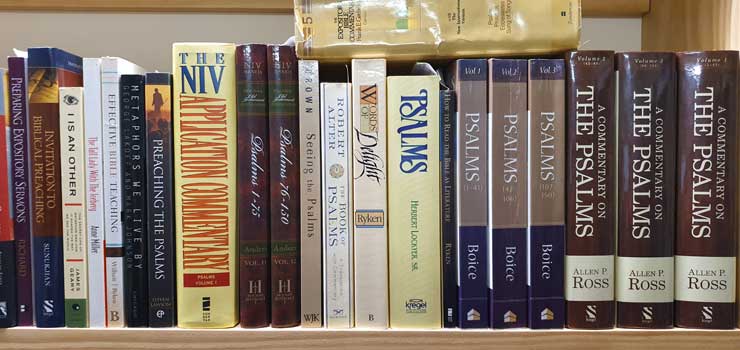
Top 5 Commentaries on the Book of Psalms
With the above information, I will now present my top 5 commentaries on the book of Psalms.
1. Psalms by James Montgomery Boice
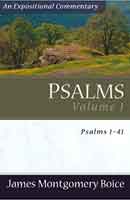
Psalms by James Montgomery Boice comes in three volumes. I have put these three commentaries first because I found them the most helpful in preparing messages for the Psalms.
These three commentaries are expositional in nature. They are a copy of Boice’s sermons on every single Psalm. You will not get in depth word studies but his commentaries are invaluable for sermon preparation and formation.
His headings and titles show how he structured the psalms for preaching. He brings pertinent applications and illuminating illustrations.
I highly recommend these three volumes if you wish to preach through the Book of Psalms.
An Expositional Commentary of the Psalms (Volume 1 [Amazon Books]) by James Montgomery Boice.
An Expositional Commentary of the Psalms (Volume 2 [Amazon Books]) by James Montgomery Boice.
An Expositonal Commentary of the Psalms (Volume 3 [Amazon Books]) by James Montgomery Boice
2. Psalms by Steven J. Lawson
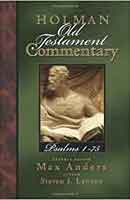
Psalms by Steven J. Lawson comes in two volumes. These two volumes are a must for pastors preaching through the book of Psalms.
These two volumes are compiled from Steven’s sermons on the Psalms. They are brief notes but they have several benefits.
Steven provides a teaching outline with brief notes. He provides life applications, prayer and deeper notes. You could say that these two commentaries are expositional, exegetical and devotional.
The introduction to Steven’s book also provides basic information about the Psalms like: a brief explanation of the literary types, a brief explanation of the literary styles and a brief explanation of the figures of speech in Psalms.
I highly recommend these two volumes if you wish to preach through the Book of Psalms.
Holman Old Testament Commentary of the Psalms (Volume 1 [Amazon Books]) by Steven J. Lawson.
Holman Old Testament Commentary of the Psalms (Volume 2 [Amazon Books]) by Steven J. Lawson.
3. The Psalms by Allen P. Ross
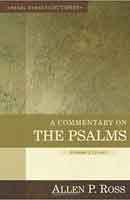
Psalms by Allen P. Ross comes in three volumes. These commentaries are exegetical commentaries.
The commentary on each psalm includes composition and context, exegetical outline and analysis, commentary in expository form and message and application.
Ross explains his approach to the exposition of the psalms in the preamble in his first volume. Ross writes: “Developing an exposition from a passage like a psalm can see daunting, but if expositors follow the basic exegetical procedures it will come together nicely” (p. 169).
Ross also provides preliminary information in the introduction concerning the nature of Hebrew poetry (parallelism and figures of speech) and the literary forms and functions in Hebrew poetry (eg lament psalms, praise psalms, pilgrim psalms, royal psalms, etc).
I highly recommend these three volumes if you wish to preach through the Book of Psalms.
A Commentary of the Psalms (Volume 1 [Amazon Books]) by Allen P. Ross.
A Commentary of the Psalms (Volume 2 [Amazon Books]) by Allen P. Ross.
A Commentary of the Psalms (Volume 3 [Amazon Book]) by Allen P. Ross
4. Psalms by Willem A. VanGemeren
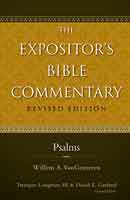
Psalms by Willem A. VanGemeren is volume five of a twelve volume set on the whole Bible – The Expositor’s Bible Commentary.
This one volume has about nine hundred (900) pages of great commentary with introductory information relating to the nature of Hebrew poetry and the literary forms of Hebrew poetry.
VanGemeren with his experience and expertise provides a commentary that explains each psalm, provides a brief outline of each psalm, includes technical footnotes and notes textual variants and interpretive issues.
The Expositor’s Bible Commentary Volume 5 (Psalms [Amazon Books]) by Willem A. VanGemeren
5. Psalms by Gerald H. Wilson
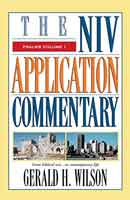
Psalms by Gerald H. Wilson is part of “The NIV Application Commentary Series.”
This volume only covers Psalms 1-72. There is a second volume that covers Psalms 73-150. However, it is written by W Denis Tucker JR. and Jamie A. Grant.
Nevertheless, these are two great commentaries on the book of Psalms. The format of these commentaries provides commentary, original meaning, bridging contexts and contemporary significance.
I personally have all of these commentaries in my library. I have used them extensively in preparing expository messages from the book of Psalms.
The NIV Application Commentary of the Psalms (Volume 1 [Amazon Books]) by Gerald H. Wilson
The NIV Application Commentary of the Psalms (Volume 2 [Amazon Books]) by W Dennis Tucker Jr & James A Grant.
Other Commentaries
1. Psalms by Herbert Lockyer Sr
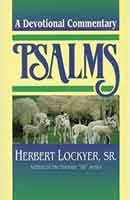
Psalms by Hebert Lockyer Sr is a devotional commentary. I used this commentary as a means of preparing myself for the preaching of the psalms.
It is a devotional commentary that shares devotional insights and little-known gems of information while applying their truths to modern living.
It is a one-volume commentary with around eight hundred (800) pages of devotional reading.
A Devotional Commentary of Psalms (Amazon Books) by Herbert Lockyer Sr.
2. Psalms by Derek Kidner
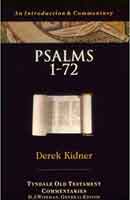
Psalms by Derek Kidner comes in a two-volume set and is part of Tyndale Old Testament Commentaries Series.
These two volumes are a much shorter treatment of the Psalms but still provide much insight into the book of Psalms.
Someone said, “Kidner’s word economy is quite remarkable and yet it is achieved simply by pointing readers back to previous comments on words, phrases, imagery and literary techniques.”
These two volumes are well set out with headings so that you can easily find the information you need.
Tyndale Old Testament Commentaries (Psalms 1-72 [Amazon Books]) by Derek Kidner.
Tyndale Old Testament Commentaries (Psalms 73-150 [Amazon Books]) by Derek Kidner.
Sermon Outlines of Psalms 1 & 2
Sermon Outline of Psalm 1
Introduction:
Three INSIGHTS For Finding True Happiness In The Lord.
1. The Person God Blesses (1:1-3)
- We see his passion (1:1a)
- We see his path (1:1b)
- We see his pleasure (1:2)
- We see his prosperity (1:3)
2. The Person God Judges (1:4-5)
- We see his path (1:4)
- We see his punishment (1:5)
3. The Person God Approves (1:6)
- We see the righteous prosper (1:6a)
- We see the wicked perish (1:6b)
Conclusion:
Sermon Outline of Psalm 2
Introduction:
Four STATEMENTS that God is still on the Throne in Heaven!
1. The Attitude of the Rebellious (2:1-3)
- They scheme vainly (2:1b)
- They stand defiantly (2:2)
- They speak arrogantly (2:3)
2. The Actions of God (2:4-6)
- God scoffs in derision (2:4)
- God speaks in displeasure (2:5-6)
3. The Authority of God’s Anointed (2:7-9)
- Jesus is God’s anointed Son (2:7)
- Jesus is God’s anointed ruler (2:8)
- Jesus is God’s anointed conqueror (2:9)
4. The Advantage of the Redeemed (2:10-12)
- We must be wise and be warned (2:10)
- We must serve the Lord and rejoice (2:11)
- We must submit to the Lord and trust him (2:12)
Conclusion:
Other Book Resources
Figures of Speech in the Bible: Explained and Illustrated (Amazon Books) by E.W. Bullinger
The Dictionary of Biblical Imagery (Amazon Books) by Leland Ryken
Words of Delight: A Literary Introduction to the Bible (Amazon Books) by Leland Ryken
How to Read the Bible as Literature (Amazon Books) by Leland Ryken
Seeing the Psalms: A Theology of Metaphor (Amazon Books) by William P. Brown
Check Out These Articles
The Exposition of Biblical Poetry
What are the different types of Psalms